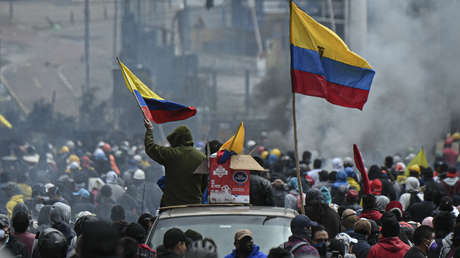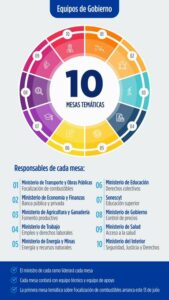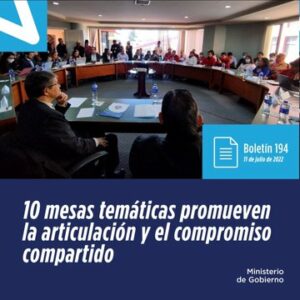Written by Daniel Edgar exclusively for SouthFront
Ecuador has returned to relative calm as the dialogues agreed to between the Indigenous movement and the national government continue. Up to now the joint workgroups formed pursuant to the agreement that ended the eighteen-day National Strike are progressing in their appointed tasks, perhaps surprisingly better than expected in many cases. It is possible that the government of Guillermo Lasso and other powerful factions and groups within the traditional ruling elite realise just how close the situation in the country was getting to plunging out of control entirely, at which point much or all of their own properties and assets (those that remain in Ecuador at least) could be at risk, notwithstanding that they are always the last to be affected by social, economic and political turmoil and conflict.
While the situation has stabilized for the moment, social conditions remain tense, the economic situation remains desperate, and the simmering resentment and mutual recriminations and mistrust between the government and the Indigenous movement have abated for the moment but remain present and deeply felt. The legal proceedings against the president of CONAIE, Leonidas Iza, have not been rescinded; at the same time, according to a communiqué released by CONAIE, investigations have been initiated by the national Prosecutor General into the legality of some of the actions taken by President Lasso and the Ministers of the Interior (Patricio Carillo) and Defence (Luis Lara) during the National Strike, and similar motions have been lodged before the National Assembly to censure the aforementioned ministers.
One of the matters to be investigated is “the presumed crime of illegal privation of liberty” in relation to the arrest of Leonidas Iza; Iza was arrested on the second day of the National Strike on the charge of “paralysing a public service”. He was subsequently granted a conditional release 24 hours later after his detention produced an immediate upsurge in the scale and intensity of the social mobilization. LINK Another matter subject to investigation (with initial proceedings taking place in the National Assembly) is the legality of some of the actions taken by the military and police forces during the National Strike, such as the forced dispersal and occupation of the Central University of Ecuador (Universidad Central de Ecuador), which had been declared a Zone of Peace, and the Casa de la Cultura in Quito, which served as a key meeting point and refuge for the Indigenous movement.
In terms of the ongoing negotiations between representatives of the government and the Indigenous movement, the topics that the respective joint working groups will address are: Fuel Supply & Prices, Public & Private Banking & Refinancing, Fomenting Production, Employment & Labour Rights, Energy & Renewable Resources, Collective Rights, Superior Education, Price Controls, Access to Health Services, Security & Justice. The proceedings are being followed by the respective government agencies, and overall coordination and supervision of the dialogue process has been designated to the ‘minister of government’ Francisco Jiménez (who was also assigned by president Lasso to conduct the initial round of negotiations with the Indigenous movement). Representatives of the Ecuadorian Episcopal Conference (Conferencia Episcopal Ecuatoriana) are accompanying the negotiations taking place within the joint working groups, and more recently a representative of the United Nations has also been appointed to accompany the process. LINK
Other social sectors
Some other social sectors and movements have belatedly taken to the streets in order to demand that the government respect and take into consideration their specific sectoral rights and interests. In particular, the national student organization and main trade union confederation held large protests in July denouncing the neoliberal policies of the government and making a series of specific demands related to their respective sectors. Among the organizers of the protests were the Federation of University Students of Ecuador (Federación de Estudiantes Universitarios del Ecuador), the National Union of Educators of Ecuador (Unión Nacional de Educadores de Ecuador), and the General Labour Union of Ecuador (Unión General de Trabajadores de Ecuador). Representatives from a broad range of social sectors also participated in the XIVth United Labour Front Convention (Frente Unitario de Trabajadores), which has convened a Great Day of National Mobilisation for the 15th of September.
However, it appears that there is still very little communication and coordination between the coordinators of these social sectors and the Indigenous movement, notwithstanding that many of their demands are identical, or at least compatible, and that they face the same opponent.
This could be a good moment for the Indigenous movement to reach out to them, discuss their situations, needs, objectives and demands and, if they prove to be compatible, provide a means for them to participate in the work of the joint groups (whether directly or, in the event of government objections, indirectly via a series of parallel committees and assemblies). Apart from potentially increasing the bargaining power and leverage of the Indigenous movement in the negotiations with the government, the inclusion of other relevant social sectors and organizations in their discussions and activities would provide enhanced access to a considerable amount of professional expertise and capabilities, as well as providing a catalyst to the formation and consolidation of tactical agreements and strategic alliances.
Their activities and functions could be further enhanced by the creation of a committee of financial, accounting and public management experts to support and cooperate with the main joint working groups in order to monitor government spending, project planning and implementation. The existence of such a committee could be crucial during the implementation phase. As in Colombia, politicians tend to promise lots of money during their election campaigns or in moments of crisis. Later, somewhat less than half of the promised money arrives, and most of the rest disappears amongst a bevy of contractors or overpriced (and often non-existent) goods and services.
At a time when successive Ecuadorian governments have unconstitutionally abolished or sidelined key accountability agencies, and controls or exercises a substantial degree of influence over the capabilities of those that remain, and the National Assembly has on many occasions proven itself incapable of taking decisive decisions and developing a meaningful and constructive course of action, the current conjuncture may offer a unique opportunity to establish and consolidate a series of parallel and autonomous community and sector-based structures for strategic political, social and economic planning, participation and project development.
According to some reports, at least one soldier (of Indigenous origin) was killed in mysterious circumstances during the National Strike. LINK While this remains pure speculation at this point, it suggests the possibility that there was at least one soldier who was deeply disturbed by being ordered to fire upon his own people and who therefore refused to do so. For the authorities, this would also raise the risk of desertion, or even that he may have been considering returning to his community – with or without his sidearm – in order to stand with his people and help defend the community in case of trouble. No doubt the ruling regime was well aware of the risk of something along these lines happening, and subjected the rank and file members of the public security forces to extremely close surveillance and control throughout the National Strike (probably with the attentive assistance of their US advisors/ supervisors, and maybe Israeli or UK communications companies, among others).
If something along these lines (a case of attempted desertion) were indeed the case, it might not be a bad idea for the remaining patriotic and loyal soldiers and police of Ecuador (those loyal to the people, that is, in the event that orders coming from the chain of command threaten the lives, safety and well-being of the people that they have sworn to defend and serve) to arrange for a very discrete way to decide, individually and in groups, in which direction they will aim and fire their weapons if at some point in the future their ‘superior officers’ give them an order to fire live ammunition against gatherings of people who are protesting in a peaceful and orderly manner…
The International Setting
A fundamental factor that permeates and affects the calculus and dynamics of the geopolitical situation in the Americas is that bilateral and multilateral relations between ‘the North’ (Canada and the United States) and ‘the South’ have typically been defined, determined and executed in their entirety by the relations, objectives and activities of the ruling elites – military, law enforcement, trade and investment are prioritized, all geared to facilitate, deepen and perpetuate the subordination of the South with the active collaboration of the political and economic elites in each country.
Very little – to zero – active and organized interaction exists among other social sectors and interests (trade unions, Indigenous Nations, representative organizations and social movements, student organizations, African Americans, or professional associations – other than those that reinforce the existing power structures and relations, whether knowingly or unwittingly).
For example, while I have not investigated this aspect in detail, as far as I am aware of none of the most influential protagonists from the era of the civil rights movement in the US even visited Latin America (although Malcolm X made it to Africa before his assassination, he paid far less attention to the US’ ‘back yard’, where Brazil and Colombia have the largest and second largest African diaspora communities in the world apart from the US itself).
To the extent that there are interactions and cooperation between the other classes and sectors of society in most cases they remain personalized and their scope and effect depend on the resources and capacities of the individuals in each moment. Inevitably, the relations and activities built in this way dwindle off or cease entirely when the individuals involved pass on. There are no organized, systematic or institutionalised agreements and mechanisms to provide sustained strategic direction and purpose and provide for continuity in the development and implementation of strategic plans and projects, or organized activities such as exchange programs between the North and the South for students, professional and activists in order to build mutual awareness of the situation in different locations and sectors, consolidate existing personal links and networks, and provide a permanent basis and setting for the development of joint strategic planning and action in the future.
This chronic absence of strategic and geopolitical awareness, planning, project development and action is apparent both in the conduct of bilateral and multilateral relations and interactions between each country in Latin America and the US as well as in the formulation and implementation of the full range of social, economic, technological and cultural policies within each country.
The same conditions of fragmentation, isolation and lack of a strategic and geopolitical perspective among marginalized social sectors also dominate bilateral and multilateral relations and determine the national agendas of the countries within Latin America. As far as I am aware, there were no instances of active solidarity (as opposed to statements of passive solidarity) to support the National Strike and social mobilization from Colombia or other neighbouring countries, notwithstanding the similar nationwide uprisings in Colombia over the last few years against very similar governmental and economic conditions, policies and repression (most of which were also led by the Indigenous movement). LINK, LINK, LINK
This state of affairs is in large part the consequence of the deliberate and meticulously planned and executed US geopolitical strategy to dominate the region, using vast forces of persuasion and dissuasion (‘hard power’ and ‘soft power’ in technical jargon, known as ‘plata o plomo’ in Colombia – silver or lead, the former for collaborators, the latter for those who defy or resist US hegemony or the power and privileges of the local ruling elite) to pre-empt the development and growth of amicable economic, political, technological and social relations and cooperation between each country in Latin America so that they remain locked into and heavily dependent upon their bilateral relations with the US. LINK
Conclusion
While many doubt whether the government of President Lasso will continue to honour its commitments into the future, particularly those that clash directly with the terms and objectives of the agreement that the government had previously concluded with the IMF, only time will tell. Presumably, in the meantime elements within the ‘public security’ forces and intelligence agencies (and their US patrons) are taking active measures to identify key personnel, infrastructure and materials among the extensive support networks that enabled the National Strike to attain such dimensions of effectiveness and resilience. It cannot be ruled out that if the government decides at some future point to renege on the agreements and resort once again to brute force in an attempt to neutralise the Indigenous movement they might attempt to launch a decisive ‘pre-emptive strike’. In either case, even if this conjecture should prove to be overly pessimistic, it would be prudent for the Indigenous movement to continue to maintain a proactive security strategy and contingency planning in order to safeguard its leadership (and their residences and families – during the coup in 2019, the kidnapping of family members to be used as hostages by rogue military forces, police or paramilitaries was one of the factors that forced so many government members to resign so suddenly), key installations and materials against the possibility of future confrontations.
MORE ON THE TOPIC:
- Ecuador key aspects and implications of the national strike reasserting control over a rogue government
- Apocalypse soon? US still scrambling and surging to develop new high tech weapons systems
- Selective assassinations continue unabated in Colombia
- The multinationals among the untouchables of the Colombian conflict
- Colombia multinationals and Indigenous people Part III recent developments
- Lawfare Colombian-style legal political and quasi-judicial harassment persecution and counterinsurgency operations in Colombia
- Preparations for the Final Phase of Regime Change in Venezuela








As long as the Ecuador government continue to be a servant of the USA and USA Big business real freedom will never happen -the poor will increase and the rich will get richer as has been the case since the Fifties due to American hegemony in South America.
There’s no more yankee-anglo hegemony in South and Central America. And in North America there’s also Mexico…
IMF international monkeys and WEF world echonomic Pedos !!!
The majority of the time, most govs under duress by the population will promise many things…but it is usually with the intent to identify leaders and locations of discontent. Not for purposes of conciliation, but for the purpose of controlling opposition. In the vast majority of cases it is far better to collapse the gov and start anew. While there is risk involved in this, it is no riskier than believing that the gov will in fact honor their word. The people need to remember that they could not trust these people in the first place and that is why they are now in the streets. The ruling parties will take this time to entrench their power and solidify support from outside to subjugate the peoples movement. These so-called negotiations are intended to get the opposition to believe they have a voice, all the while they will use subterfuge to get the opposition to agree to some of their desires, believing this is compromise…the very desires that have landed the country where it is today. Compromises will continue the involvement of outside entities such as the IMF and other western colonial entities. ‘Talks’, as they call them, are nothing but another tactic to buy time to try to weaken opposition by obfuscation as well as trying to turn groups on one another. They need to wipe the slate clean and get rid of every vestige of the colonial powers.
You can’t make a deal with Satan and his Jews as they will always break it.
me love guinea pig in Quito —best rectum probe since jens rammed strap on in my rectum
Yankees, you don’t have anymore any backyard.
What ruling ELITES? Ruling parasites, ruling scum, ruling snakes, ruling FILTH but ELITES lololol rofl. Stop pandering to their egos.
Well if this is new. They voted in a pro-US fascist leader who suppresses the indigenous poor but count on them to do all the dirty work for the rich. When they had a indigenous he treated his people right no protests, go figure!
I have been two times in Ecuador, People in Ecuador still blames President Correa about their failure of all country while their corrupted politicians plunged and sell every richness and resource in Ecuador to Global Market. After Rafael Correa IMF and World Bank sugest Ecuador to move to US DOLLAR, and everybody knowns that would be the Doom of Ecuador. ALL countries in CALA Region should be worried because USA Policies are advanced in all countries, PERU is facing Big issues, BRAZIL is in trouble because Bolsonaro wont step down on being Brazil President (USA wont take Lula Da Silva as President of Brazil), URUGUAY is more servant to USA than ever in his history, in PARAGUAY the US Puppet Goverment is the most corrupt jn three decades… and here we go again, USA controlled all over his backyard in LATAM CALA Region.